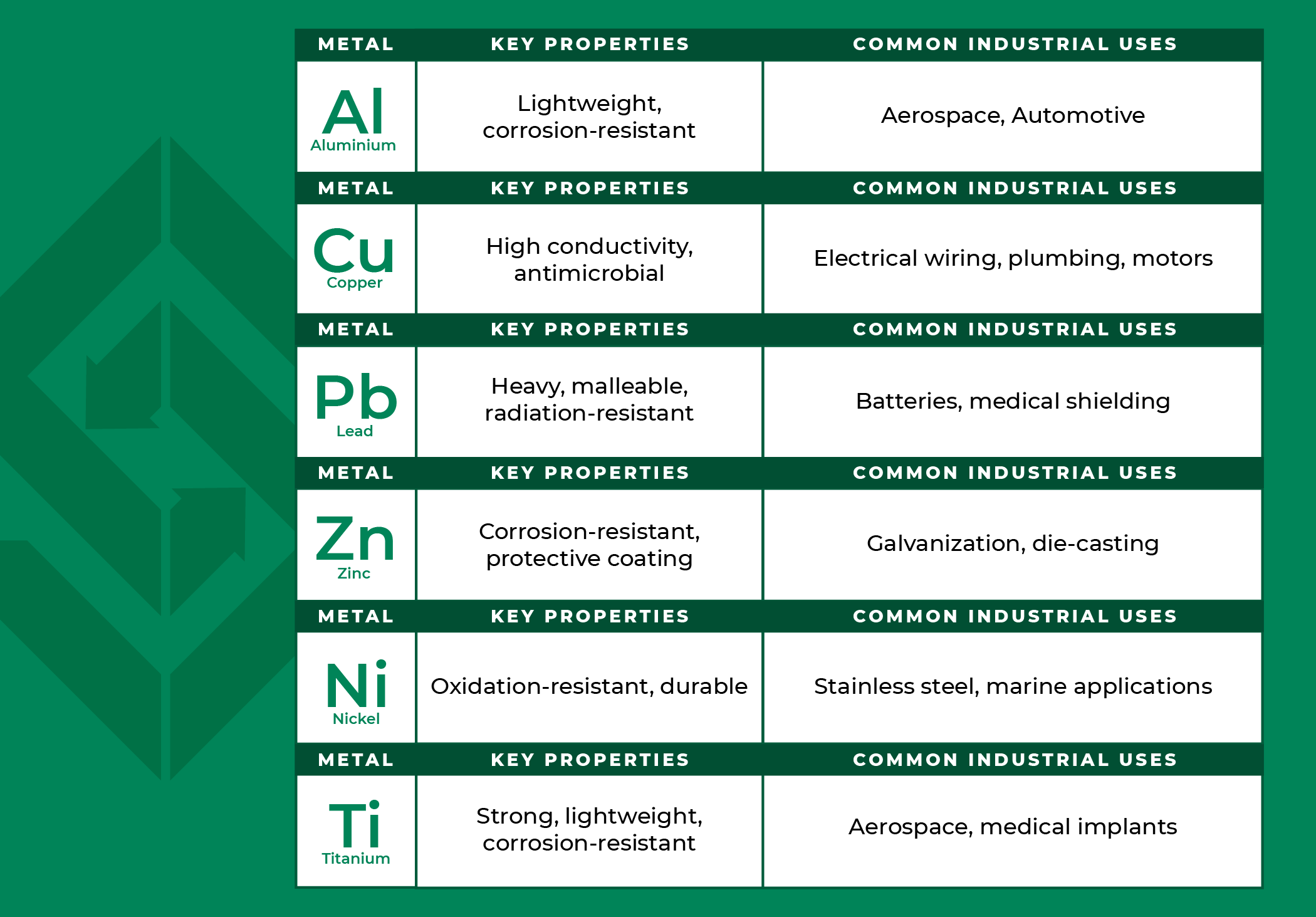
The Essential Guide to Recycling Nonferrous Metals
Nonferrous metals are critical to industrial operations thanks to their unique properties such as corrosion resistance, lightweight composition and high conductivity. Unlike ferrous metals that contain iron and are prone to rust, nonferrous metals are ideal for industrial applications and products that require durability, efficiency and sustainability. These metals play a pivotal role in manufacturing and production, from aerospace and automotive to construction and electronics, including, but not limited to:
- Manufacturing Facilities: Factories that produce metal parts often generate scrap materials, such as aluminum shavings, brass cut-offs and rejected copper components.
- Demolition & Construction Sites: Building structures, electrical wiring and plumbing systems often contain recyclable nonferrous metals.
- Electronics & Automotive Recycling: Old vehicles, appliances and electronic devices contain valuable metals like copper, aluminum and nickel.
- Industrial Equipment: Decommissioned machinery and outdated infrastructure often house recoverable nonferrous metals.
If your business deals with nonferrous metals, better understanding how and where to recycle them can help you maximize your recycling ROI and support your sustainability efforts. This guide reviews what qualifies as a nonferrous metal, where these materials are commonly found and how industrial businesses can benefit from recycling them.
What Are Nonferrous Metals?
Nonferrous metals are those that do not contain significant amounts of iron. Therefore, they offer superior resistance to corrosion, high strength-to-weight ratios and excellent electrical and thermal conductivity. These qualities make them indispensable for a wide range of applications.
Common nonferrous metals include:
- Aluminum
- Copper
- Lead
- Zinc
- Nickel
- Titanium
- Brass and Bronze (copper-based alloys)
Many of these metals are highly recyclable, making them a sustainable resource and source of revenue for industrial clients.
Key Nonferrous Metals and Their Most Common Industrial Uses
Aluminum
- Characteristics: Lightweight, corrosion-resistant, strong.
- Uses: Aerospace (aircraft frames), construction (windows and siding), automotive (engine components) and packaging (beverage cans).
- Where to Find Aluminum Scrap: Manufacturing remnants, old vehicles, discarded window frames and beverage containers.
Copper
- Characteristics: Excellent electrical and thermal conductivity, corrosion resistant.
- Uses: Electrical wiring, plumbing, roofing, motors and transformers.
- Where to Find Copper Scrap: Electrical cables, plumbing fixtures, air conditioning units and industrial machinery.
Lead
- Characteristics: Heavy, malleable, highly resistant to corrosion.
- Uses: Batteries, radiation shielding (medical equipment) and piping.
- Where to Find Lead Scrap: Old car batteries, lead-acid industrial batteries and X-ray shielding materials.
Zinc
- Characteristics: Corrosion-resistant, often used as a protective coating.
- Uses: Galvanizing steel, die-casting (automotive parts) and alloys (brass production).
- Where to Find Zinc Scrap: Roofing materials, discarded galvanized steel and die-cast machinery components.
Nickel
- Characteristics: High resistance to oxidation and extreme temperatures.
- Uses: Stainless steel production, chemical processing, marine engineering and batteries.
- Where to Find Nickel Scrap: Stainless steel equipment, industrial batteries and marine components.
Titanium
- Characteristics: Lightweight, exceptionally strong and highly resistant to corrosion.
- Uses: Aerospace, medical implants, military applications and sports equipment.
- Where to Find Titanium Scrap: Decommissioned aircraft parts, medical devices and high-performance vehicle components.
A Breakdown of Nonferrous Metals
|
Metal |
Key Properties |
Common Industrial Uses |
|
Aluminum |
Lightweight, corrosion-resistant |
Aerospace, automotive, packaging |
|
Copper |
High conductivity, antimicrobial |
Electrical wiring, plumbing, motors |
|
Lead |
Heavy, malleable, radiation-resistant |
Batteries, medical shielding |
|
Zinc |
Corrosion-resistant, protective coating |
Galvanization, die-casting |
|
Nickel |
Oxidation-resistant, durable |
Stainless steel, marine applications |
|
Titanium |
Strong, lightweight, corrosion-resistant |
Aerospace, medical implants |
The Benefits of Recycling Nonferrous Metals for Industrial Clients
Recycling nonferrous metals offers significant economic and environmental benefits. Here’s why industrial clients should prioritize recycling:
- Cost Savings – Using recycled nonferrous metal requires less energy and resources compared to extracting virgin materials, leading to lower production costs.
- Environmental Responsibility – Nonferrous metal recycling reduces the need for mining, conserves natural resources and minimizes industrial waste.
- Regulatory Compliance – Many industries must comply with stricter regulations on waste management and sustainability. Recycling helps businesses meet these requirements.
- Revenue Generation – Companies that collect and/or save and sell scrap metal can transform waste into a profitable asset.
How SMI Partners with Businesses Recycling Nonferrous Metal
At SMI, we specialize in the collection, processing and recycling of nonferrous metals. Whether you’re a manufacturing facility generating scrap metal, a contractor with surplus building materials or an automotive business with outdated equipment, we offer efficient and environmentally responsible recycling solutions.
Our team ensures that all nonferrous metal materials are handled properly, maximizing their value while reducing environmental impact. By working with SMI, industrial clients gain access to competitive pricing, expert consultation and seamless logistics for scrap metal collection and processing.
Nonferrous metals are a vital resource across multiple industries, offering strength, durability and efficiency. Understanding where to source, recycle and repurpose these materials can lead to significant cost savings and environmental benefits.
By partnering with SMI, businesses can optimize their nonferrous metal recycling efforts, ensuring that valuable materials are reused rather than wasted. Whether you have aluminum, copper, nickel or any other nonferrous metal scrap, SMI is your trusted recycling partner.
Want to learn more about how SMI can help your business with nonferrous metal recycling? Contact us for a quote today!
